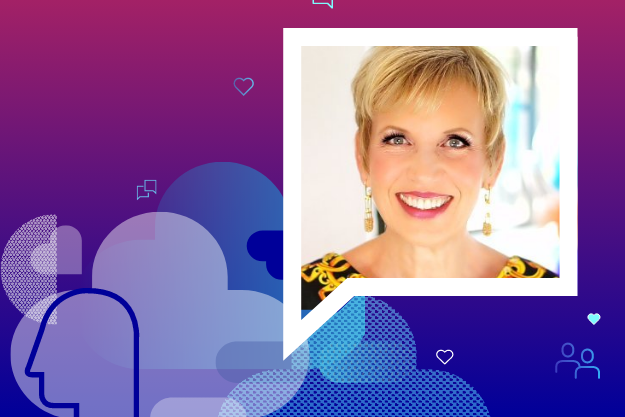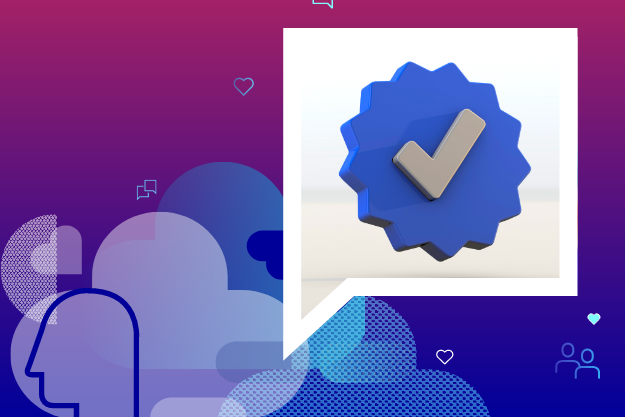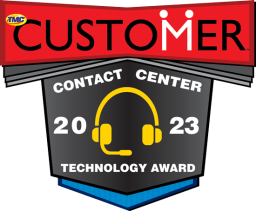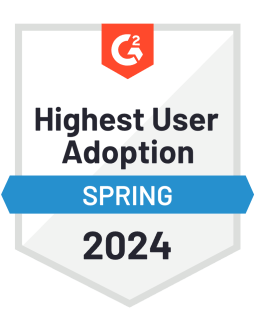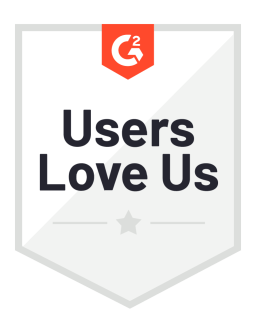Social media marketing can be a demanding role that requires significant time and effort. Without the right strategy and approach, this line of work could take a significant toll on your mental health.
The content you produce is essentially shared with the entire world, which means social media marketers (SMMs) wake up every day to a potential avalanche of alerts ranging in tone, demand, and complexity. And most face unrealistic expectations to “go viral,” consistently produce engaging content with limited resources, or, depending on the demands of your business, reply instantly to every comment and question from your social followers.
However, the best work comes from the best version of you. Whether you work alone or on a team, it’s incredibly important to also prioritize your mental health and well-being while navigating your responsibilities.
During Mental Health Awareness Month, we’ve put together a few actionable tips for marketers to minimize the harmful effects of social media and bring a positive mindset to day-to-day tasks. Read on to learn what real people in your role have to say about mental health in today’s era of social media.
1. Set healthy boundaries
One of the misconceptions in social media marketing is that you have to be “always on.” While it’s definitely true that interacting with your online audience on their schedules can result in better engagement and reach, it’s unrealistic to try to do so 24/7.
One way to avoid over-committing to real-time social media activity is by setting daily boundaries. Make sure you’re attentive to incoming questions and concerns, but set aside time every day to address them rather than logging in right when they first show up. Most of the time, your followers will be okay with a slight delay in your response.
Things that matter more than social media likes:
— Erica Schneider (@ericasmyname) April 13, 2023
-Family + friends
-Mental health
-Physical health
-Hobbies
-Sales
-Revenue
-Yummy leftovers
-Enjoying your life
Keep showing up but keep it in perspective.
Planning your content can work wonders in decreasing stress. With the help of a social media management platform, you can have your cross-platform content plan ready to go without lifting a finger. However, content scheduling is just one piece of the puzzle. Social media managers are responsible for fielding inquiries and comments from their audiences. Be sure to set expectations by making your operating hours known on your pages. Setting up automated responses for when customers reach out after hours can be a great way to let your audience know your availability and increase overall satisfaction.
2. Take a break from the screen
Research shows that excessive screen time is directly linked to depression, anxiety, poorer sleep, and overall lower well-being. While most marketing and social media jobs require you to be online all day, there are ways to lessen the negative effects of screen time.
Take daily breaks as your schedule allows, and ensure some of that time is spent outside. Blocking off these breaks in your calendar prevents colleagues from booking meetings during those times, and keeps you accountable for actually taking a break. Other ways to spend your breaks include cooking lunch, chatting with coworkers, stretching, cleaning up your space, or trying a simple breathing exercise.
3 ways I'm investing in myself:
— Jason Vana (@jasonvana) April 22, 2023
- talk to a therapist weekly
- read 20 pages each day
- journal (most) days
Still working on the last one.
How are you investing in yourself?
Breaks from the screen can help you cultivate creativity — a major part of content creation — as well as help prevent burnout. They can also be an opportunity to explore new hobbies. Check out these mental health and time management apps for more guidance:
Headspace: Meditation and mood-boosting sounds
Calm: Guided meditation and sleep services
Serene: Motivation and habit tracking
Todoist: Checklist app for time management
Notion: Personal or business planning and organization app
BetterHelp: Stress management and on-demand therapy
3. Celebrate big and small successes
Some social media marketers may suffer from imposter syndrome, feelings of doubt, and unworthiness despite successful accomplishments in the role. Social media managers describe their mental health as a mere 6.35 out of 10 on an average day. One way to avoid imposter syndrome and spread general positivity is to take note of your wins, no matter how small they are. Celebrate those wins with your friends, family, coworkers, or online community.
Once you’re able to qualify your successes, the feelings of doubt and incompetence will start to fade. You can also share any concerns about imposter syndrome with your manager and explore ways to bring more visibility to social media campaigns across your broader team.
To social media managers during a major crisis - Your feelings are valid. It does suck. Yes those effected may have it worse, but you don't get to tune it out. You are navigating hundreds of sad and negative comments. It takes a toll on your mental health. Take care of yourself.
— Bailey Cargill (@BaileyCargill) March 27, 2023
Consider seeking out communities of social media marketers and managers to share your successes. Other individuals in your role will understand your ups and downs, and will likely be excited to celebrate your wins.
Industry expert Matt Navarra created “The Social Media Geekout,” a Facebook group especially for SMMs to connect. Additionally, check out Mari Smith’s “Social Scoop'' on Facebook, providing social media trends and support for marketers.
4. Set realistic work expectations
It might sound great to turn off all of your social media notifications and completely unplug once the workday ends. However, sometimes that’s just not possible for SMMs who need to keep tabs on their brand profiles.
Start by setting lenient time limits on these apps and websites, and adjust as needed to fit your schedule. Social listening tools like Emplifi’s also allow you to set up spike alerts — notifications outside of work hours only for comments and social posts identified as urgent, as opposed to getting all mentions and notifications after hours.
I still work in social. Almost quit, but started challenging the "always on" mentality.
— Nicole Tabak (@nicoletabak) April 28, 2023
I've turned off notifications. Set app limits for social networks. Put my energy into other interests.
I'm still helping my clients, but my mental health is better with these boundaries. https://t.co/QFr9WRZYf5
It may also be wise to re-evaluate the number of tasks you have on your plate each day. While it would be nice to finish everything on your to-do list today, it’s more realistic to spread out those tasks throughout the week.
Additionally, think about your definition of success. Instead of seeing success and failure as the only two options, consider it as a scale. While that social post could have gotten more impressions and engagement, getting one or two likes doesn’t necessarily mean failure. This mindset can also help tackle imposter syndrome.
5. Outsource and automate
Your coworkers are called your “team” for a reason. Don’t be afraid to lean on your manager and team for support when you hit a wall. Start by evaluating the tasks taking up the majority of your time, and sit down with your team to discuss any opportunities to offload your day-to-day work. This gives you more time to focus on strategizing, planning, and real-time community engagement while taking advantage of your team members' strengths.
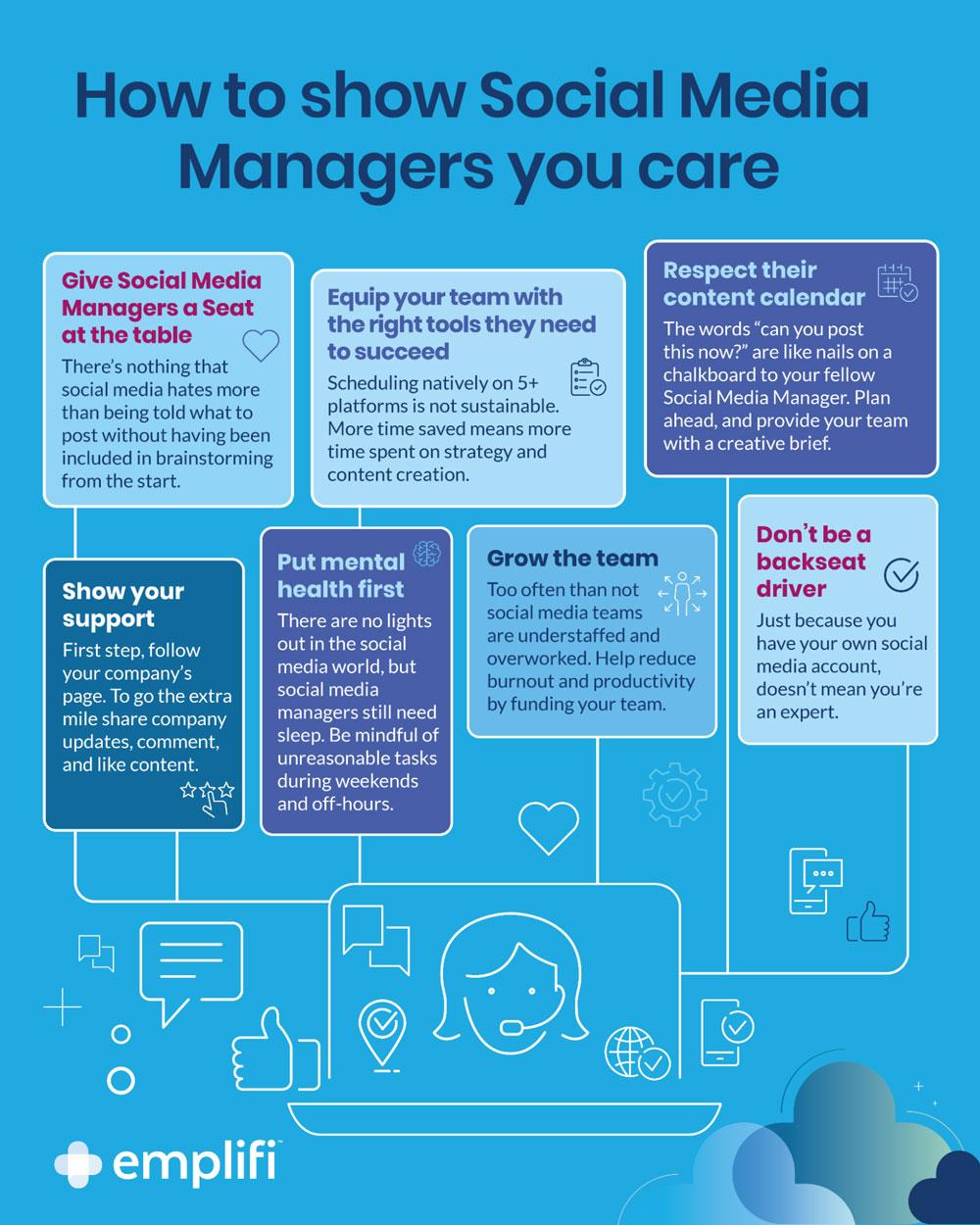
Your coworkers may have ideas or strategies that end up creating a more efficient work cycle, but you won’t know until you ask for their help. Take this time as an opportunity to evaluate the tech tools at your disposal — many platforms for SMMs boast a range of tools to help you save time and effort. Artificial intelligence tools like Emplifi’s AI Composer or ChatGPT can also support your creative process by rephrasing content, sparking inspiration for headlines, and more.
The real cleanse you need this Diwali is to cleanse yourself of self-doubt.
— Gurnoor | Online Personal Branding (@GurnoorKBehl) October 21, 2022
Social Media can be a scary place. It can impact your Mental Health.
It's okay to take a pause. Slow down. Reflect. Read a book rather than the screen.
Don't be hard on yourself, friend.
6. Make physical health fun
It’s no secret that your physical health has a huge impact on your mental health. Instead of telling yourself to go to the gym more, take a fun approach to exercise by trying out new activities alone and with friends. Try taking a dance class, joining a rec sports league, or going for a long walk in a new neighborhood.
Just taking your meetings on the go while you walk around the block makes a difference. Working individuals who participate in walking meetings are 5.25% more likely to report being creative at their jobs than those who don’t. You’ll feel better, and it’ll show through in the work you do.
Mental health should come first, always
Whether you’re starting out in social media or you’ve established a long career in the field, it’s always important to prioritize your mental health.
Social media can be an overwhelming place, and ensuring you’ve created realistic boundaries alongside a supportive community can make a huge difference both in how you feel and the quality of your work. We all enjoy work more with a healthy work-life balance, and it will shine through your performance, productivity, and creativity.
Key takeaways
Set healthy boundaries with your time and availability.
Plan and schedule social media content in advance.
Take breaks frequently and try screen-free hobbies in your spare time.
Celebrate your wins with family, friends, and coworkers.
Evaluate your daily workload and set realistic goals.
Outsource work to your team and use technology to automate tasks.
Prioritize physical fitness in new ways.















